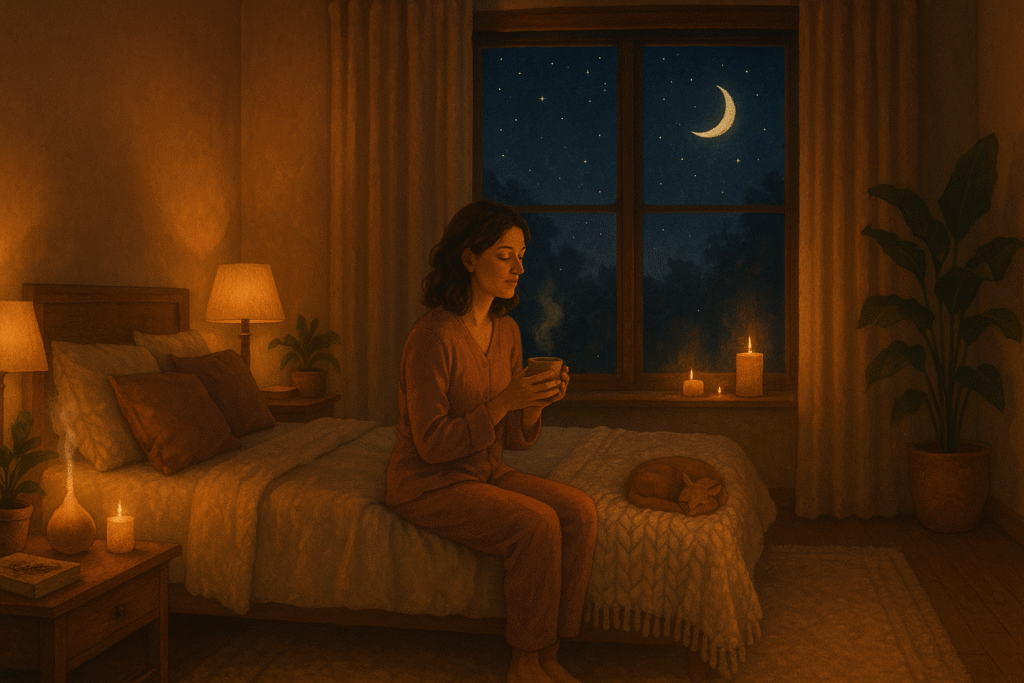Unlock Sacred Sleep: Reboot Your Mind Overnight
Sleep is not simply the absence of wakefulness; it's a profound state of consciousness where healing happens, memories consolidate, and our emotional landscapes are tended with the care of a master gardener. Yet for millions of us, bedtime has become a battlefield where anxiety meets exhaustion, where racing thoughts collide with tired bodies.
Tonight, let's reclaim sleep as your birthright. Let's explore how to transform your bedroom into a sanctuary and your sleep into a sacred practice that nourishes every aspect of your being. Because when you sleep well, you don't just rest—you rise.
Unveiling the Mind: The Sacred Science of Sleep
To understand the profound importance of sleep, we must first appreciate what happens in your brain during those precious hours of rest. Sleep is not a passive state but an active process of restoration, consolidation, and renewal that is essential for both mental and physical health.
During sleep, your brain cycles through distinct stages, each serving a unique purpose. In the deeper stages of non-REM sleep, your brain waves slow down dramatically, allowing for the clearance of metabolic waste through the glymphatic system—essentially, your brain's cleaning crew. This process removes toxins, including amyloid-beta plaques associated with Alzheimer's disease, making quality sleep a powerful form of neuroprotection.
REM sleep, characterized by rapid eye movements and vivid dreams, is when your brain processes emotions and consolidates memories. Dr. Matthew Walker's groundbreaking research at UC Berkeley reveals that REM sleep acts like overnight therapy, helping to strip the emotional charge from difficult memories while preserving the important lessons they contain. This is why a good night's sleep can literally help you see problems with fresh eyes.
Your circadian rhythm, your body's internal clock, is orchestrated by a tiny region in your brain called the suprachiasmatic nucleus. This biological timekeeper responds to light and darkness, regulating the release of hormones like melatonin and cortisol. When this rhythm is disrupted—by irregular sleep schedules, blue light exposure, or stress—it affects not just your sleep but your mood, immune function, and cognitive performance.
Research from Harvard Medical School shows that chronic sleep deprivation affects the prefrontal cortex, the brain region responsible for executive function, emotional regulation, and decision-making. This explains why everything feels more overwhelming when you're tired—your brain literally has less capacity to cope with stress and make clear decisions.
The relationship between sleep and mental health is bidirectional. Poor sleep can contribute to anxiety and depression, while anxiety and depression can disrupt sleep. However, improving sleep quality often leads to significant improvements in mood and emotional resilience, making sleep optimization a powerful tool for mental wellness.
Creating Your Sleep Sanctuary: Practices for Restorative Rest
Transforming your relationship with sleep begins with understanding that rest is not earned—it's required. These practices are gentle invitations to honor your body's need for restoration and to create conditions that support deep, healing sleep.
Practice 1: The Evening Wind-Down Ritual
Begin your transition to sleep 60-90 minutes before bedtime. Dim the lights throughout your home, signaling to your brain that day is ending. Create a sequence of calming activities: perhaps a warm bath with lavender, gentle stretching, or reading a few pages of poetry. The key is consistency—your nervous system learns to anticipate sleep when you follow the same ritual each night.
During this time, practice what I call "digital sunset"—turning off screens and electronic devices. The blue light emitted by phones, tablets, and computers suppresses melatonin production, making it harder to fall asleep. If you must use devices, consider blue light blocking glasses or apps that filter blue light.
Use this time to practice gratitude by reflecting on three things that went well during your day. This simple practice shifts your nervous system from the day's stress into a state of appreciation and calm, preparing your mind for restorative sleep.
Micro-Habit 2: The 4-7-8 Breathing Technique
When you're in bed and ready to sleep, practice this ancient breathing pattern: Inhale through your nose for 4 counts, hold your breath for 7 counts, then exhale through your mouth for 8 counts. Repeat this cycle 3-4 times. This technique activates your parasympathetic nervous system, naturally slowing your heart rate and preparing your body for sleep.
If counting feels stressful, simply focus on making your exhale longer than your inhale. This signals safety to your nervous system and helps quiet the mental chatter that often keeps us awake. Remember, the goal isn't to force sleep but to create conditions where sleep can naturally arise.
Practice 3: The Sleep Environment Optimization
Transform your bedroom into a true sanctuary by paying attention to temperature, darkness, and sound. Keep your room cool (around 65-68°F), as your body temperature naturally drops during sleep. Invest in blackout curtains or an eye mask to create complete darkness, and consider a white noise machine or earplugs to mask disruptive sounds.
Remove work materials, exercise equipment, and anything that creates mental stimulation from your bedroom. Your brain should associate this space with rest and intimacy only. Consider adding elements that promote calm: soft textures, calming scents like lavender or chamomile, and perhaps a small plant to improve air quality.
Pay attention to your mattress and pillows—they should support your body comfortably without causing pain or discomfort. If you wake up with aches or feel like you're fighting your bed, it may be time for an upgrade. Quality sleep is an investment in your health, not a luxury.
Micro-Habit 4: The Morning Light Ritual
Within 30 minutes of waking, expose yourself to natural sunlight for 10-15 minutes. This helps regulate your circadian rhythm and improves sleep quality the following night. If natural light isn't available, consider a light therapy lamp designed for circadian rhythm support.
Combine this with gentle movement—perhaps a short walk outside or some stretching in a sunny window. This practice signals to your body that it's time to be alert and active, creating a clear distinction between day and night that supports healthy sleep patterns.
Practice 5: The Worry Journal
If racing thoughts keep you awake, keep a notebook by your bedside. When worries arise, write them down along with one small action you can take tomorrow to address each concern. This practice helps externalize your worries, preventing them from cycling endlessly in your mind.
End your worry journal session by writing one thing you're looking forward to tomorrow. This shifts your mental focus from problems to possibilities, creating a more positive emotional state for sleep. Remember, nighttime is not the time for problem-solving—it's time for rest and restoration.
Practice 6: The Progressive Muscle Relaxation
Starting with your toes, tense each muscle group for 5 seconds, then release and notice the sensation of relaxation. Move systematically through your body: feet, calves, thighs, abdomen, hands, arms, shoulders, and face. This practice helps release physical tension while giving your mind a specific focus, preventing it from wandering to stressful thoughts.
As you release each muscle group, imagine breathing into that area and sending it gratitude for all it does for you throughout the day. This combination of physical relaxation and loving awareness creates ideal conditions for peaceful sleep.
Myths and Truths: Demystifying Sleep Wellness
Myth 1: "I can catch up on sleep during weekends"
The Truth: While extra sleep can help with acute sleep debt, chronic sleep deprivation cannot be fully "repaid" with weekend sleep-ins. Irregular sleep schedules disrupt your circadian rhythm, making it harder to fall asleep and wake up naturally. Consistency in sleep timing is more important than occasionally sleeping longer. Your body thrives on routine, and maintaining regular sleep and wake times—even on weekends—supports better overall sleep quality.
Myth 2: "Alcohol helps me sleep better"
The Truth: While alcohol may help you fall asleep faster, it significantly disrupts sleep quality. Alcohol suppresses REM sleep during the first part of the night and causes fragmented sleep as it metabolizes. You may wake up feeling unrefreshed despite spending adequate time in bed. For truly restorative sleep, it's best to avoid alcohol within 3-4 hours of bedtime.
Myth 3: "Some people just don't need much sleep"
The Truth: While there are rare genetic variations that allow some individuals to function on less sleep, the vast majority of adults need 7-9 hours of quality sleep per night. Many people who claim to function well on little sleep are actually experiencing chronic sleep deprivation and have adapted to feeling tired. True short sleepers represent less than 1% of the population.
Embracing the Sacred Rest
As we reach the end of our journey into the realm of sleep, I want you to understand that prioritizing rest is not selfish—it's essential. In a culture that glorifies busyness and treats sleep as weakness, choosing to honor your need for rest is a radical act of self-care.
Remember: understanding what we feel is the first step to changing how we live. Your relationship with sleep reflects your relationship with yourself. When you create space for rest, you're telling your nervous system that you are safe, that you matter, and that you deserve to be restored.
Sleep is not time lost but time invested in your mental, emotional, and physical well-being. Every night offers you the opportunity to begin again, to let go of the day's tensions and wake up renewed. Your dreams are not just random neural firing—they're your psyche's way of processing, healing, and integrating your experiences.
Be patient with yourself as you implement these practices. Sleep patterns don't change overnight, and there will be nights when rest feels elusive despite your best efforts. This is normal and temporary. What matters is your commitment to creating conditions that support sleep and treating yourself with compassion when sleep doesn't come easily.
Tonight, as you prepare for rest, remember that you are worthy of peaceful sleep. Your bedroom is your sanctuary, your sleep is your medicine, and your rest is your birthright. Sweet dreams, dear one—may your sleep be deep, your dreams be healing, and your awakening be gentle.


